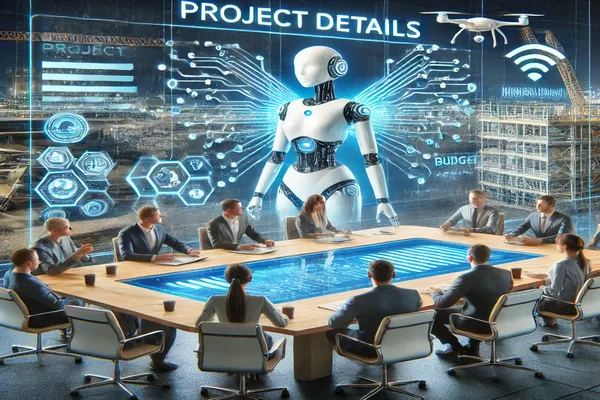
AI for Construction Bidding: Smart Proposals in 2025
Smart Proposals: How AI Enhances Construction Bidding and Proposal Writing
The construction industry is at the forefront of infrastructure development, enabling urbanization and economic growth. However, the sector faces significant challenges, including labor shortages, tight deadlines, high competition, and razor-thin profit margins. To thrive in this demanding environment, construction companies must streamline operations, enhance efficiency, and adopt innovative technologies.
Artificial intelligence (AI) is revolutionizing the construction industry, offering transformative tools that improve accuracy, productivity, and cost control. Among its many applications, AI is reshaping how construction firms create and manage proposals—a critical process for securing projects and maintaining a competitive edge. Beyond proposal writing, AI's applications span cost estimation, resource allocation, risk management, and project monitoring, delivering measurable financial and operational benefits.
In this blog, we’ll explore how AI transforms proposal writing, delve into its financial implications, and highlight broader applications within the construction industry.
Traditional Proposal Writing: A Time-Consuming Challenge
Proposal writing is one of the most vital yet labor-intensive tasks for construction firms. A compelling proposal not only showcases a company’s expertise but also demonstrates its ability to meet project requirements efficiently and cost-effectively. However, creating such proposals often involves:
Significant Time Investment: Drafting a detailed proposal typically takes weeks, particularly for complex projects with specific compliance requirements.
Inconsistent Quality: Depending on the team or individual responsible, proposals may vary in structure, language, and effectiveness.
Frequent Errors: Integrating data from multiple sources, such as cost estimates, blueprints, and schedules, increases the likelihood of inaccuracies or inconsistencies.
Last-Minute Revisions: Tight deadlines often leave little room for strategic adjustments, leading to rushed or incomplete submissions.
These challenges not only strain resources but also hinder a company's ability to compete effectively. AI-driven tools address these pain points by streamlining the proposal process and improving output quality.
AI’s Role in Transforming Proposal Writing
AI simplifies and accelerates proposal writing by automating repetitive tasks, analyzing data with precision, and generating actionable insights. Here’s how AI optimizes this process:
1. Automated Content Creation
AI tools leverage natural language processing (NLP) to analyze project requirements and generate professional, tailored content. These tools can:
Draft customized proposals based on client specifications.
Highlight a company’s strengths and unique value proposition.
Adapt tone and language to align with client preferences.
By automating content creation, AI ensures that proposals are both compelling and consistent, regardless of the author.
2. Precision in Cost Estimation
Cost estimation is a critical component of construction proposals. AI systems analyze historical data, industry benchmarks, and current market trends to generate accurate estimates for labor, materials, and equipment. This reduces the risk of:
Underbidding: Leading to financial losses and strained resources.
Overbidding: Making the proposal less competitive.
3. Data Integration and Visualization
AI tools can integrate data from various sources, such as blueprints, compliance documents, and project timelines, ensuring consistency and accuracy. Additionally, AI can create visuals like:
3D Renderings: To illustrate project designs.
Graphs and Timelines: For clear representation of costs, schedules, and milestones.
4. Enhanced Collaboration
AI platforms enable real-time collaboration among team members, streamlining the input and review process. Automated notifications and version control features ensure that everyone stays aligned, even on tight deadlines.
5. Intelligent Revisions
Revisions are often necessary to address client feedback or refine project details. AI tools suggest edits and improvements, enhancing clarity, coherence, and alignment with client goals while minimizing delays.
The Financial Impact of AI on Proposal Writing
AI’s influence extends beyond efficiency, delivering measurable financial benefits that improve profitability and competitiveness. Below are key areas where AI creates value:
1. Employee Efficiency Gains
AI reduces the time employees spend on repetitive tasks, allowing them to focus on strategic activities. For example:
Proposal drafting time can be cut by 70%, enabling project managers to oversee multiple bids simultaneously.
Administrative staff can allocate more time to compliance, risk assessment, or client relationship management.
2. Cost Savings from Error Reduction
Mistakes in proposals—such as incorrect cost estimates or incomplete compliance documents—can lead to costly revisions, penalties, or lost opportunities. AI minimizes these errors, saving firms thousands of dollars per project.
3. Higher Bid Success Rates
AI tools create more polished and compelling proposals, increasing the likelihood of winning contracts. A modest 15% increase in bid success rates can significantly boost annual revenue for medium and large firms.
4. Long-Term ROI
While AI systems require upfront investment, the long-term returns—in the form of increased efficiency, reduced overheads, and higher project win rates—far outweigh the costs.
Quantifying the Financial Gains
To illustrate the financial impact, consider a mid-sized construction firm handling 50 proposals annually. Here’s how AI-driven tools translate into cost savings and revenue growth:

By adopting AI, the company not only saves resources but also positions itself to bid on more projects and increase profitability.
Broader Applications of AI in Construction
While proposal writing is a critical application, AI is transforming other aspects of construction, including:
1. Project Management
AI tools enable real-time monitoring of project progress, helping managers identify delays, allocate resources, and stay on schedule. Predictive analytics provide foresight into potential bottlenecks, enabling proactive decision-making.
2. Workforce Optimization
AI-driven scheduling tools optimize labor allocation, ensuring that teams are neither underutilized nor overburdened. This improves productivity while reducing overtime costs.
3. Risk Mitigation
AI systems analyze historical data to predict risks, such as cost overruns, safety hazards, or compliance issues. These insights enable firms to implement preventive measures, saving time and money.
4. Sustainability Initiatives
AI helps construction firms minimize waste and environmental impact by optimizing materials, reducing energy consumption, and identifying sustainable alternatives.
5. Communication and Collaboration
AI-powered platforms centralize communication, ensuring that all stakeholders—clients, contractors, and internal teams—stay informed. Chatbots and automated notifications further enhance collaboration by addressing routine inquiries and updates.
Real-Life Example: AI in Action
A mid-sized construction firm recently integrated AI into its proposal writing and project management processes. Here’s what they achieved in just one year:
Proposal Success Rates: Increased from 30% to 45%, adding $2 million in annual revenue.
Time Savings: Proposal drafting time reduced by 65%, saving $120,000 annually in labor costs.
Error Reduction: Improved accuracy in cost estimation and compliance checks avoided $75,000 in penalties.
These results demonstrate the transformative potential of AI as both a strategic and financial asset.
Future Trends in AI for Construction
As AI technology evolves, new applications are emerging that promise to further revolutionize construction. Key trends include:
Digital Twin Technology: Virtual replicas of physical structures allow for real-time monitoring and optimization of projects.
Autonomous Equipment: AI-driven machinery, such as robotic excavators, enhances efficiency and safety on construction sites.
Smart Procurement: Predictive analytics optimize supplier selection and material procurement, reducing costs and delays.
Conclusion: Embracing AI for Long-Term Success
AI is not just a tool for automation—it’s a game-changer for the construction industry. From crafting winning proposals to optimizing project management and mitigating risks, AI delivers tangible benefits that directly impact a company’s bottom line.
For firms ready to embrace innovation, investing in AI tools is no longer optional; it’s essential for staying competitive in an evolving market. By harnessing the power of AI, construction companies can unlock new levels of efficiency, profitability, and growth.
